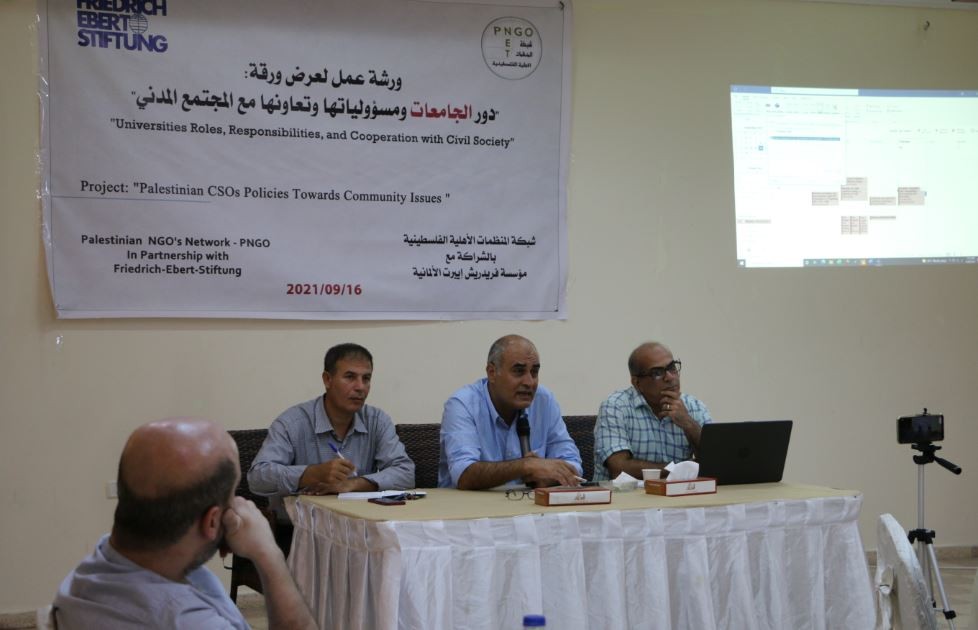NGOs representatives, academics, and experts called for organizing the relationship between NGOs and universities by setting agreed mechanisms for fruitful cooperation in a way that benefits Palestinians.
That happened during a workshop organized by the Palestinian NGOs Network (PNGO) entitled “Universities roles, responsibilities, and cooperation with civil society”, which was implemented in partnership with the Friedrich Ebert Stiftung. The aim of such joint forces is to strengthen the relationship between the two sides, especially in the fields of scientific research, rehabilitation, training, and capabilities development.
Amjad Al- Shawa, PNGO director, said in his opening speech that the relationship between universities and civil society organizations dates back to before the time of the first intifada in 1987 in which it developed over the past three decades.
Al-Shawa explained that the two sides reached a cooperation phase several years ago to reinforce their relationship within the framework of the national struggle to promote the principles of democracy and human rights and to develop educational means. This agreement represents an important reference for both parties, and came to light after many meetings and workshops.
Al-Shawa stressed the need to benefit from the existing resources and capabilities of the two parties towards joint work in the interest of students, researchers, and NGOs, especially in the field of studies and research.
On his part, Dr. Usama Antar, Programs Director at the Friedrich Ebert Stiftung, expressed the value of the relationship and cooperation between Palestinian civil society organizations and universities. He considered that there was an urgent need to advance university education in the Gaza Strip.
Antar called for the necessity of the alliance between NGOs and universities, stressing the need to strengthen extracurricular activities, as well.
Dr. Bassam Abu Hashish, Associate Professor of Educational Administration at Al-Aqsa University in Gaza, presented a paper on The Role, Responsibility, and Cooperation of Universities with NGOs.
During the workshop, Abu Hashish reviewed the history and the relationship between the two parties and presented a detailed description armed with numbers, statistics, and information regarding the conditions and crises befalling universities and higher education institutions in Palestine, especially in Gaza.
Abu Hashish considered that the university crisis in Palestine is part of the general crisis, which extends its ramifications in economy, politics, society, culture, and education.
Moreover, Abu Hashish stressed that any serious attempt to overcome the negative effects in the field of higher education cannot be limited to the field alone, but should extend to all social and economic policies and the general political system.
In addition, encountering the imbalance-causing factors in the educational system is linked to a process of deepening the concepts and mechanisms of democracy and political consolidation. This situation enforces the realization that the roots of this crisis go back in one aspect to direct Israeli occupation of our country over the past years.
In the same context, Abu Hashish presented a number of proposals and recommendations for cooperation between NGOs and universities, represented in developing the concept of voluntary work by considering it a graduation requirement for students.
Adding to that, he recommended organizing the process of training university students with local officials or civil society organizations to be involved in different and active campaigns, such as blood donation that happened in the light of demonstrations, marches, incursions, and confrontations with the Israeli occupation forces and settlers.
Furthermore, he pointed out that continuing education centers are vastly important due to being another aspect of social responsibility for the services they provide to the local community.
Universities that hold numerous valuable books, journals, studies, and periodicals are nothing less of a vital component that contributes to supporting scientific production and cultural movement in institutions and society.
Abu Hashish highlighted the importance of linking university education with the educational, cultural, professional, and development community needs. In his vision, this helps in bridging the gap theory and labor market in a way that employs university education to meet the immediate and future needs of the individual and society through a strategic planning approach and short, medium and long-term visions.
He also called for encouraging night studies for adults who are not allowed to join regular programs as well as diversifying community service programs (lectures, conferences, seminars, workshops, competitions, marathons) so that they reach various groups with different intellectual backgrounds and ages.
On the same note, Abu Hashish asserted the need to respond adequately and effectively to the requirements of comprehensive development in Palestine, especially with Palestine's adoption of the 2030 Sustainable Development Goals. Most goals are relatable with the educational role of universities, civil society organizations, and the provision of integrated student care programs that include social, psychological, counseling and cultural care.
Following the presentation, Ahmed Ashour, Tamer Institute for Community Education director, commented by showing the importance of having a vision for education and higher education, especially in training and development.
Ashour indicated that within the framework of cooperation between universities and community organizations, university students can acquire the necessary skills for the local and regional job market.
Finally, the attendees discussed and suggested improvements that could improve the reality of the work of NGOs in university education. This would in turn reflect positively on students and university courses that meet labor market requirements.




